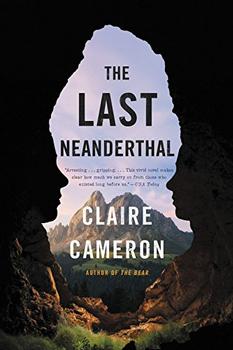Summary | Excerpt | Reading Guide | Reviews | Beyond the Book | Readalikes | Genres & Themes | Author Bio

Prologue
They didn't think as much about what was different. There was good reason for this, as they lived in small family groups. Every day was spent among people who were similar to them. The bodies that sat around the fire shared the same kind of cowlick at the backs of their heads, or the same laugh, or teeth that were equally crooked. Every time a head turned to look, a body could find one part of itself in another. It's because of their similarities to us that I can speak for them when I say that much of what you've heard isn't true. They were kind and clever. They had hands with opposable thumbs and a light dusting of hair on the backs. They had hearts that throbbed in their chests when they saw certain people, and this happened more than you might expect. Their brains were larger than ours by about 10 percent. Many of us have inherited up to 4 percent of their DNA, and now that both genomes have been sequenced, we know that theirs differed from ours by only about 0.12 percent. To be fair, these slight variations are significant. They had a sensitive patch of skin on the gums above the front teeth; by curling up the top lip, they could feel the heat of a body from a mile away. Their ears could pinpoint where a drop of water had fallen in a pond long after the ripples were gone. Their eyes could see the unique pattern of bark on each tree and this allowed them to tell one from the next, just as we can with human faces.
If they knew I was telling you this, though, it would embarrass them. They did not like to focus on inward thoughts, as this lay the body open to outward dangers. They would hold up a hand, lower their eyes, a slight pink to the cheek. If they were still alive today, they would want to make clear one pressing point: They were much like you.
But they aren't alive. They are extinct. The knowledge that some- thing is extinct often leads to worry. You are probably already feeling guilty because you assume that I'm about to place the responsibility for their end on modern humans. We compare ourselves to them through one stark reality: We survived and they did not. The space between those two things, life and death, is where our trouble starts. We focus on that one difference and it dominates our thoughts. Blame comes next.
But the last thing they would want you to worry about is their passing. They didn't dwell much on difference, and it was the resemblances between seasons, bodies, and species that stood out to their eyes. They were so few in number. The world in which they lived was vast and empty. As a matter of survival, they tried to focus on what was the same.
If you happened on one in the woods—say, a female named Girl with a shock of red hair—it would not be by accident. She would have sensed you coming long before, felt curious about another up- right primate, and allowed you to approach. She would make a noise in the brush to let you know she was there. Maybe she would drop her spear to show that she didn't mean you harm. She would spread the fingers of her left hand and raise that palm to greet you.
The polite thing to do would be to raise your right hand the same way. Walk slowly toward her.
Her body is streaked with dirt and only partially covered with a loose cloak of bison fur. She is often too hot and doesn't like the feel of tight animal hides on her skin. Her breath comes in plumes from her nose, expelling heat from her broad body into the cold air. Look at her densely packed muscles. They hold a kind of strength more on par with a bear's. As you get closer, notice the earthy smell of bison meat and sour stomach. There is nothing wrong with her; that's just from how she lives.
Take a deep breath because you will feel intimidated. And you should. This is your instinct taking hold. You've never seen such a magnificent creature before, but your ancestors did. They knew from experience that she could close up your throat with one squeeze. They passed this sensible fear on to you.
Excerpted from The Last Neanderthal Copyright © 2017 by Claire Cameron. Used with permission of Little, Brown and Company, New York. All rights reserved.






Your guide toexceptional books
BookBrowse seeks out and recommends the best in contemporary fiction and nonfiction—books that not only engage and entertain but also deepen our understanding of ourselves and the world around us.